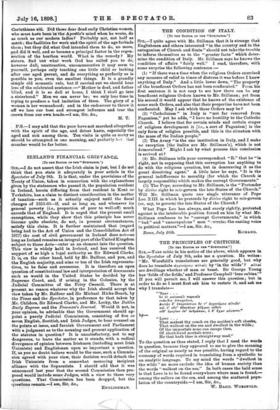IRELAND'S FINANCIAL GRIEVANCE.
[TO THE EDITOR Or THE "SPECTATOR.1
do not assert that the Irish claim is just, but I do not think that you state it adequately in your article in the Spectator of July 9th. It is that, under the provisions of the Treaty of Union, taken in connection with the explanations ,given by the statesmen who passed it, the population resident 'in Ireland, herein differing from that resident in Kent or Yorkshire, has a claim to distinct consideration in the matter of taxation—such as it actually enjoyed until the fiscal changes of 1853-60—if, and so long as, and whenever its general poverty (i.e., proportion of poor to well-off) much sxceeds that of England. It is urged that the present small exemptions, while they show that this principle has never become quite obsolete, do not, in present circumstances, satisfy this claim. It is further maintained that (regard being had to the Act of Union and the Consolidation Act of 1817) the cost of civil government in Ireland does not—so long as Ireland remains an integral part of the United Kingdom subject to those Acts—enter as an element into the question. This view is widely held in Ireland, and has received the support of so high a legal authority as Sir Edward Clarke. It is, on the other hand, held by Mr. Balfour, and you, and the English majority, and nine or ten of the Irish representa- tives, to be false and erroneous. It is therefore an open question of constitutional law and interpretation of documents such as would in the United States be decided by the Supreme Court, and, if arising in the Colonies, by the -Judicial Committee of the Privy Council. There is at present no reason whatever why the Irish should accept the view taken by Mr. Balfour and Sir Michael Hicks-Beach, by the Times and the Spectator, in preference to that taken by _Mr. Childers, Sir Edward Clarke, and Mr. Lecky, the Dublin Daily Express and the Freeman's Journal. Would it not, in your opinion, be advisable that the Government should ap- point a purely Judicial Commission, consisting of five or seven English, Scottish, and Irish Judges, to hear counsel on the points at issue, and furnish Government and Parliament with a judgment as to the meaning and present application of the statutes in question P It is unsatisfactory, not to say dangerous, to leave the matter as it stands, with a radical divergence of opinion between Irishmen (including most Irish Unionists) and Englishmen upon so important a question. If, as you no doubt believe would be the case, such a Commis- sion agreed with your view, their decision would detach the Irish Unionists from a somewhat menacing incipient alliance with the Separatists. I should add that it was announced last year that the second Commission then pro- posed would include some Judges, with a view to these very 'questions. That Commission has been dropped, but the questions remain.—I am, Sir, &o.,
ENGLISHMAN.


































 Previous page
Previous page